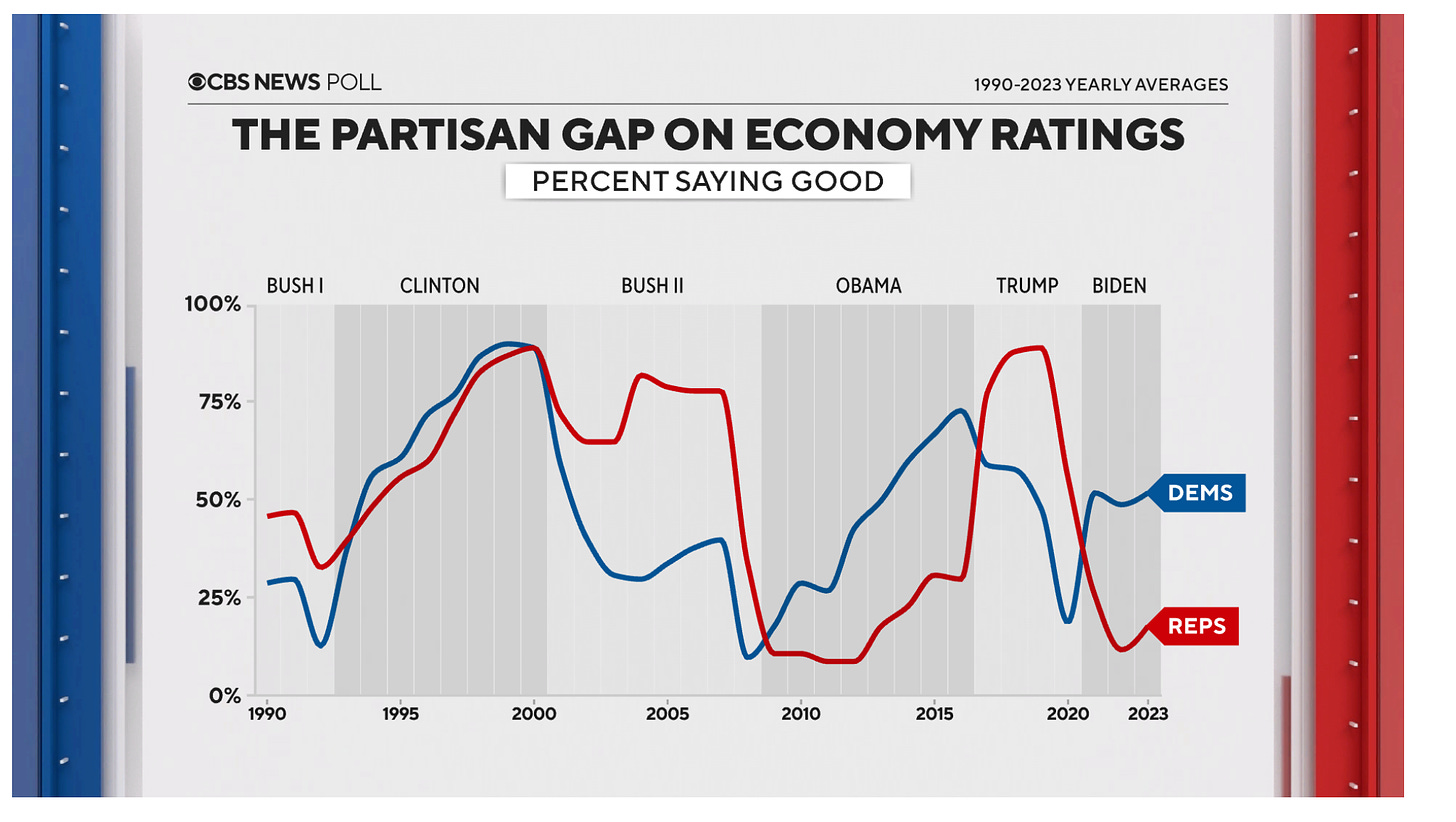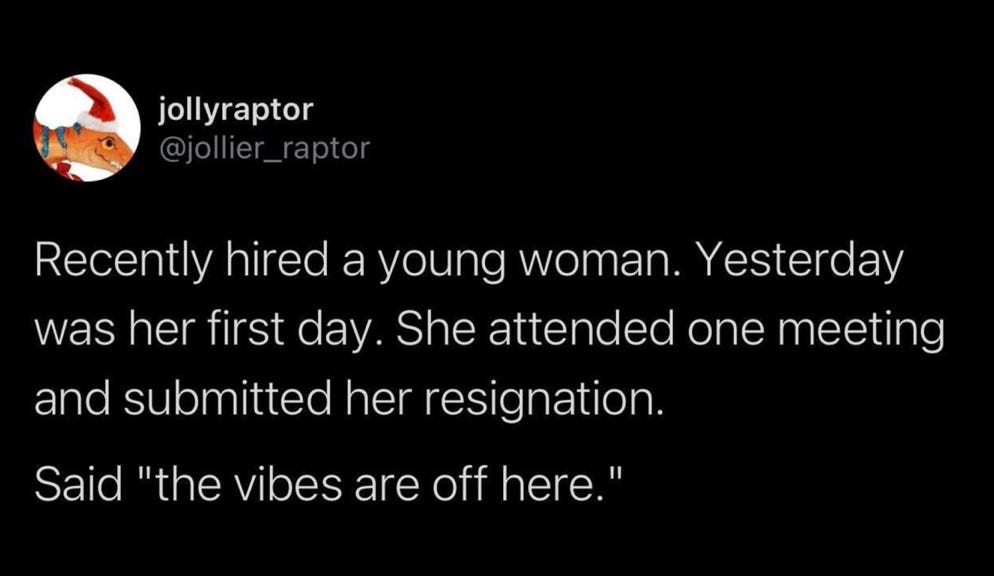The Vibes-Are-Off Thanksgiving
Welcome to The Sunday Morning Post and thanks for reading. I hope everyone has a happy and relaxed Thanksgiving. Of all of the things I am thankful for this year, the fact that so many people check their emails each Sunday morning to read these articles is one of them. So thank you, and have a great week, everybody.
“The vibes are off,” my younger coworkers will say when a situation or experience doesn’t feel quite right. I’m sure as older people like me incorporate the use of the vibes to describe things that are a bit off, it will cease to become the cool thing to say, but it’s a useful way to point out when something is off without needing to pinpoint the exact reason why or do some sort of deep-dive analysis. The vibes have gone viral a bunch of times in the last year, including a famous tweet that was probably meant as a joke but exploded into an online debate about work ethic, intergenerationalism, office etiquette, and toxic work cultures (screenshot below):
I wrote a bit about the weirdness of the economy in July 2021 in a previous article, “The Eat, Drink, and Be Merry for Tomorrow We Die Economy,” The point of that piece was that money was starting to not feel real, people were spending in weird ways, and that there was just a lot of absurdity and fatalism in the air. I’m sure psychologists have a term for it, but absurdity begets further absurdity. And in the same way, our feelings about something impact our actions, which impacts the actions of others, which continue to ripple through society and the economy especially in this era of attention-enhancing digital algorithms.
So where are we at today? Much of the financial absurdity of 2021 (e.g. meme stocks, digital tokens, cryptocurrencies, etc.) has settled out and corrected back to normalcy. But there is still a weirdness in the air. Or, as some might say, the vibes are off.
Consider the following:
The labor market continues to be historically strong. The unemployment rate is 3.9%, which is near all-time lows. Wages are now rising faster than inflation. Yet in the most recent national Pew survey on the economy, 72% of Americans called the economy “bad” while only 27% called it good.
A recent Quinnipiac University poll on the economy found similar numbers: 71% of Americans rated the economy as “not good” or “poor.” But the kicker? 60% of Americans rated their own financial situation as “good” or “excellent.”
People are anxious about their investments, but the S&P 500 is up 17.6% year-to-date. The NASDAQ is up a whopping 35%!
There is a school of thought in political science that when it comes to elections (especially presidential elections) that external factors like the economy, global affairs, and one-off events like large storms or unanticipated tragedies matter more to the results of an election than even do the actual candidates and their positions. That is worth more of a discussion at some point, but the fact remains: the economy, in particular, has a significant bearing on election outcomes. No doubt President Biden wants the economy to be as strong as possible come next October/November. But he and his team have to be wondering with rising GDP, low unemployment, rising wages, and robust equity markets, why his approval rating is just 39% (I’m sure many readers could offer their own explanations, which I’m steering clear of today).
For much of the past year or so, there has been a lot of talk about whether the economy is either in or heading towards a recession. Economists disagree about the technical definition of a recession and if we have been in one, but the actual economic data at least at the moment suggest we are not; it’s hard to have a recession with so many new jobs being created, wages rising, etc. But why are people acting like the economy is either teetering on the edge or already in the tank? My short explanation: the vibes are off.
As best I can tell, the term “Vibecession” traces back to a Substack post by Kyla Scanlon in June 2022, who wrote:
People want a simple solution for Why Things are Bad (and I do too) but things are bad (and good) for many different reasons. The overwhelming nature of it all creates a Vibecession. Where economically speaking, things are okay-ish but in reality… the vibes are off. People are feeling bad…
…when the vibes are off - when we think about how Recessions come about (beyond the technical aspects) it makes sense that we would somehow end up with the vibes of a Recession, but maybe not the economic reality of one (yet).
I think it is safe to say we are in a Vibecession. What has contributed to this Vibecession? Inflation, no doubt, has been one of the key variables. Even though this past week’s CPI report showed inflation continuing to moderate to an annualized level of 3.2%, well below last year’s rate of 8.0%+, people still have locked-in pessimism about inflation from all the times they have gone to the grocery store or taken their family out to eat or paid for supplies or labor for a home renovation project in the past 18 months and been negatively surprised by the sticker price. Even though prices are now moderating, it will take some time for people to feel and internalize that.
Rising interest rates are a big factor too. Anyone who has tried to borrow money whether to buy a house or a car, to get a business loan, or who has peeked at their credit card interest rates in the past year, is certainly not feeling great about the borrowing environment.
Another reason is politics. Consider the chart below via CBS News, which shows that just 15% of Republicans consider the economy to be good right now while 52% of Dems say that it is.

You can see in the chart above how Americans in party of the president always feel notably better about the economy than their neighbors on the opposite side of the aisle: during the administrations of George W. Bush, Barack Obama, and Donald Trump, the party of the president always had more positive view on the economy than the out-party. Interestingly, during the Clinton years, Democrats still were more positive than Republicans, but the lines were much closer and fairly correlated. Today, in an economy about which a lot of people feel generally bad, Republicans feel really bad about things.
Lastly, the vibes are bad because all of us (Democrats, Republicans, everyone in-between including those of us who don’t feel like they have a political home) are living in a world where the negative is amplified. Negativity sells better. It gets more media attention, it gets splashier headlines, and the algorithms on Facebook, Twitter, and the like typically fuel rage and frustration more robustly than joy and camaraderie. The constant drip, drip, drip of negativity is impacting our brains in ways that I don’t think we really fully understand yet. It also feels overwhelming: like the world is more complicated than any one person can influence or control, which leads to feelings of negativity and stress. People have a general sense that something is wrong, but they can’t quite figure out what to do about it.
I have much more to say about this topic, but it deserves its own article or perhaps an actual series of articles. In the meantime, try to notice next time you are scrolling through social media or reading an online news site or flipping through cable news what percentages of the stories and updates are negative versus positive. I would wager there are many more negative things in your feeds and on your TV screens than positive.
We are on the precipice of a very difficult year. Presidential election years in this country (with many lower races for governor, members of Congress, senators, and local races typically occurring in the same years) are nasty. My advice to people is this: turn off the devices. Log out of Facebook, maybe not permanently but at least more regularly. Turn off the cable news. Hold an actual print newspaper in your hand and read it, or better yet, a book. Even better still, read it at a coffee shop or cafe or bar and talk in-person, face-to-face with those around you. Or just go for a walk and chat with your neighbors. I think we would all re-discover the common bonds of humanity that run through all of us are actually much stronger than the algorithm-fueled patter that bombards us every day through the screens we carry around in our pockets, that sit on our desks, and that occupy corners of our living rooms, kitchens, and, increasingly so, our bedrooms. Just turn these things off for awhile and exercise your freethinking brain and at the same time, exercise some compassion and care for those around you. We will need every ounce of that we can get to make it through the next year and to celebrate Thanksgiving 2024 without complete disdain for one another.
For now, have a great week everybody, and if you are reading this in the first few days after it was first published on 11/19/23, have a very Happy Thanksgiving!
Ben Sprague lives and works in Bangor, Maine as a Senior V.P./Commercial Lending Officer for Damariscotta-based First National Bank. He previously worked as an investment advisor and graduated from Harvard University in 2006. Ben can be reached at ben.sprague@thefirst.com or bsprague1@gmail.com.
I have no weekly round-up this week, but if you’re interested, you can read my pieces entitled The Tired Thanksgiving from 2021 and The Expensive Thanksgiving from 2022. As I read back upon these titles, maybe I myself need to be a little bit more positive! Any predictions on what the title will be next year? Maybe The Recovery Thanksgiving once we make it through Election Day 2024.




